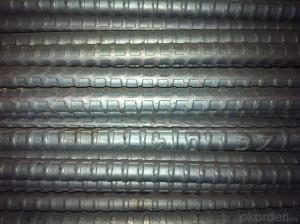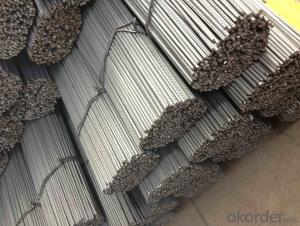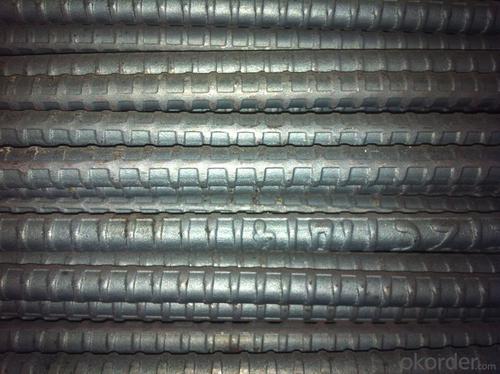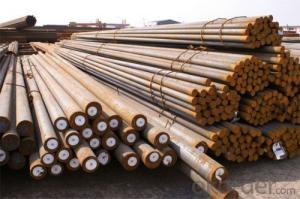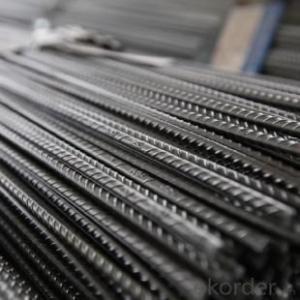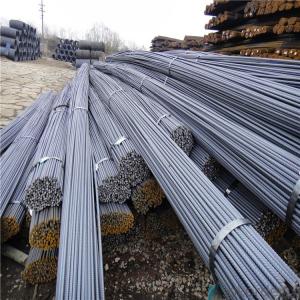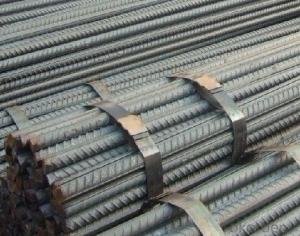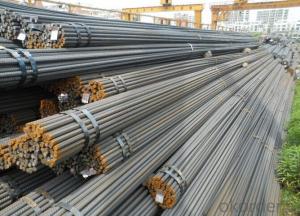Deformed Steel Bar 10mm 12mm Steel Rebar
- Loading Port:
- Shanghai
- Payment Terms:
- TT OR LC
- Min Order Qty:
- 50 m.t.
- Supply Capability:
- 10000 m.t./month
OKorder Service Pledge
OKorder Financial Service
You Might Also Like
Specification
Deformed Steel Bar 10mm 12mm Steel Rebar
Product Applications:
Deformed Steel Bar, 10mm 12mm Steel Rebar are ideal for structural applications and are widely used in the construction of buildings and bridges, and the manufacturing, petrochemical, and transportation industries.
Main Product Features:
· Premium quality
· Prompt delivery & seaworthy packing (30 days after receiving deposit)
· Can be recycled and reused
· Mill test certification
· Professional Service
· Competitive pricing
Product Specifications:
Manufacture: Hot rolled
Grade: HRB335,HRB400,HRB500
Certificates: ISO, SGS, BV, CIQ
Length: 6m – 12m, as per customer request
Packaging: Export packing, nude packing, bundled
Deformed Steel Bar | ||
Diameter (MM) | Cross Sectional Area (MM2) | Theorectical Weight (KG/M) |
6 | 28.27 | 0.222 |
8 | 50.27 | 0.395 |
10 | 78.54 | 0.617 |
12 | 113.1 | 0.888 |
14 | 153.9 | 1.21 |
16 | 201.1 | 1.58 |
18 | 254.5 | 2 |
20 | 314.2 | 2.47 |
22 | 380.1 | 2.98 |
25 | 490.9 | 3.85 |
28 | 615.8 | 4.83 |
32 | 804.2 | 6.31 |
36 | 1018 | 7.99 |
40 | 1257 | 9.87 |
Grade | Technical data of the original chemical composition (%) | |||||||
C | Mn | Si | S | P | V | |||
HRB500 | ≤0.25 | ≤1.60 | ≤0.80 | ≤0.045 | ≤0.045 | 0.04-0.12 | ||
Physics capability | ||||||||
Yield Strength(N/cm2) | Tensile Strength(N/cm2) | Elongation (%)
| ||||||
≥500 | ≥630 | ≥12 | ||||||
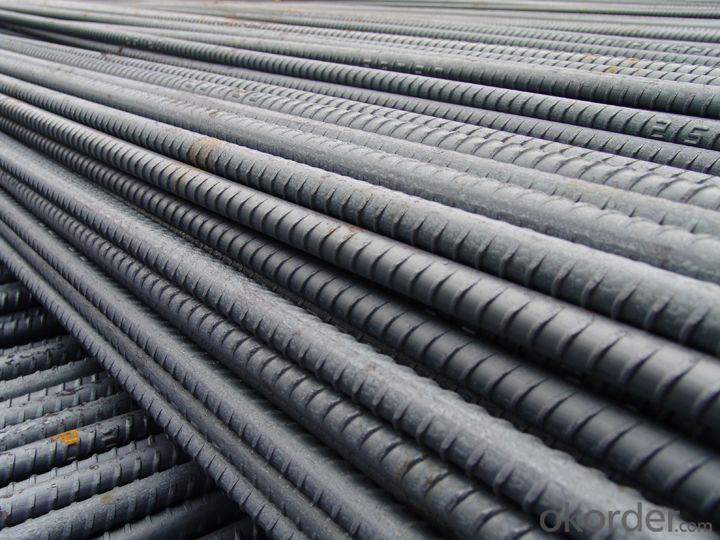
- Q: Can steel round bars be used in the manufacturing of shafts?
- Yes, steel round bars can be commonly used in the manufacturing of shafts. Steel round bars possess excellent strength, durability, and resistance to wear and tear, making them ideal for shaft applications. Additionally, their round shape allows for easy machining and shaping into the desired dimensions and specifications required for shafts.
- Q: Can steel round bars be used in the manufacturing of gears?
- Yes, steel round bars can be used in the manufacturing of gears. Steel round bars are commonly used in gear manufacturing due to their high strength, durability, and resistance to wear and tear. The round shape of the bar allows for easy machining and shaping into the desired gear design. Steel round bars also have excellent mechanical properties, such as high tensile strength and good fatigue resistance, which are essential for gears that experience heavy loads and repetitive motions. Additionally, steel round bars can be heat-treated to further enhance their hardness and toughness, making them suitable for demanding gear applications. Overall, steel round bars are a popular choice in gear manufacturing due to their versatility and reliability.
- Q: Are steel round bars available in different surface finishes?
- Yes, steel round bars are available in different surface finishes. The surface finish of a steel round bar refers to the treatment or coating applied to the surface to enhance its appearance, protect it from corrosion, or improve its performance in specific applications. Common surface finishes for steel round bars include polished, brushed, mill finish, galvanized, and coated with materials like chrome, nickel, or zinc. These different surface finishes cater to various requirements and preferences in terms of aesthetics, protection against corrosion, and functionality in different industries and applications.
- Q: What are the different heat treatment methods for steel round bars?
- Some of the common heat treatment methods for steel round bars include annealing, normalizing, quenching, tempering, and case hardening.
- Q: What are the different heat treatment processes used for steel round bars?
- There are several heat treatment processes that are commonly used for steel round bars to enhance their mechanical properties and improve their overall performance. These processes include annealing, normalizing, quenching, tempering, and case hardening. 1. Annealing: This process involves heating the steel round bars to a specific temperature and then cooling it slowly to relieve internal stresses and improve its ductility. Annealing also refines the grain structure of the steel, making it softer and more workable. 2. Normalizing: Similar to annealing, normalizing involves heating the steel round bars to a specific temperature, but in this case, it is cooled in still air. Normalizing helps to refine the grain structure and improve the steel's mechanical properties, such as strength and toughness. 3. Quenching: Quenching is a rapid cooling process that involves immersing the steel round bars in a quenching medium, such as oil, water, or polymer. This process is used to achieve high hardness and strength by transforming the steel's microstructure, known as martensite formation. However, quenching can also make the steel more brittle, so it is often followed by tempering. 4. Tempering: Tempering is a heat treatment process that involves reheating the quenched steel round bars to a specific temperature and then cooling it slowly. This process helps to reduce the brittleness caused by quenching and improves the steel's toughness and ductility. The temperature and duration of tempering can be adjusted to achieve the desired mechanical properties. 5. Case hardening: Case hardening is a surface heat treatment process used to increase the hardness and wear resistance of the steel round bars. It involves introducing carbon or other alloying elements to the surface of the steel and then heating it to a specific temperature. This process forms a hardened outer layer while maintaining a tough core. These different heat treatment processes provide steel round bars with a wide range of mechanical properties and performance characteristics, allowing them to be used in various applications, including automotive, construction, manufacturing, and aerospace industries. The specific heat treatment process selected depends on the desired properties, the steel composition, and the intended application of the round bars.
- Q: How do I choose the right grade of steel round bar for my application?
- Choosing the right grade of steel round bar for your application depends on several factors. Firstly, consider the specific requirements of your application such as the desired strength, hardness, corrosion resistance, and machinability. Additionally, assess the environmental conditions the steel will be exposed to, such as temperature, humidity, and chemical exposure. Consulting with a materials engineer or steel supplier can provide valuable guidance, as they can recommend grades that align with your application's needs and budget. Ultimately, selecting the right grade of steel round bar requires careful consideration of these factors to ensure optimal performance and longevity.
- Q: Can steel round bars be used for making conveyor belts?
- No, steel round bars are not suitable for making conveyor belts as they lack the necessary flexibility and surface properties required for effective and efficient conveyor belt operation. Conveyor belts are typically made from materials such as rubber or synthetic fabrics that provide durability, grip, and flexibility to facilitate the movement of goods.
- Q: How are steel round bars classified based on their shape?
- Steel round bars are classified based on their shape as either hot-rolled or cold-drawn round bars.
- Q: What are the advantages of using spring steel round bars?
- Spring steel round bars have numerous advantages: 1. Exceptional strength: Known for their high strength, these round bars can withstand extreme stress and strain. They are perfect for applications that require durable and strong materials. 2. Remarkable flexibility: These round bars are incredibly flexible and can be easily shaped, bent, or formed without losing their strength. This quality makes them suitable for a wide range of manufacturing processes. 3. Superior elasticity: With excellent elasticity, these round bars can return to their original shape after being deformed or stressed. This elasticity is crucial for applications that require shock or vibration absorption. 4. Fatigue resistance: These round bars are highly resistant to fatigue and can endure repeated cycles of loading and unloading without losing their mechanical properties. This reliability and longevity make them ideal for demanding applications. 5. Exceptional toughness: Spring steel round bars exhibit outstanding toughness, enabling them to withstand sudden impacts or heavy loads without breaking or fracturing. They are perfect for harsh environments or heavy-duty operations. 6. Corrosion resistance: Many spring steel round bars are made from corrosion-resistant alloys, protecting them against rust and other forms of corrosion. They are ideal for applications where moisture or corrosive substances are present. 7. Cost-effective: Compared to other types of steel or materials, spring steel round bars offer a cost-effective solution. Their durability and longevity reduce the need for frequent replacements, resulting in long-term cost savings. In conclusion, spring steel round bars have numerous advantages, including high strength, flexibility, superior elasticity, resistance to fatigue, exceptional toughness, corrosion resistance, and cost-effectiveness. These properties make them a preferred choice in various industries such as automotive, construction, manufacturing, and aerospace.
- Q: Can steel round bars be used in food processing applications?
- No, steel round bars should not be used in food processing applications. Steel round bars are typically made from carbon steel, which can contain impurities and may not meet the necessary standards for food safety. In food processing applications, it is important to use materials that are specifically designed and approved for contact with food, such as stainless steel. Stainless steel has a higher resistance to corrosion, is easier to clean, and does not react with food or alter its taste. Therefore, it is recommended to use stainless steel round bars or other food-grade materials for food processing applications to ensure the safety and integrity of the food being processed.
Send your message to us
Deformed Steel Bar 10mm 12mm Steel Rebar
- Loading Port:
- Shanghai
- Payment Terms:
- TT OR LC
- Min Order Qty:
- 50 m.t.
- Supply Capability:
- 10000 m.t./month
OKorder Service Pledge
OKorder Financial Service
Similar products
Hot products
Hot Searches
Related keywords
